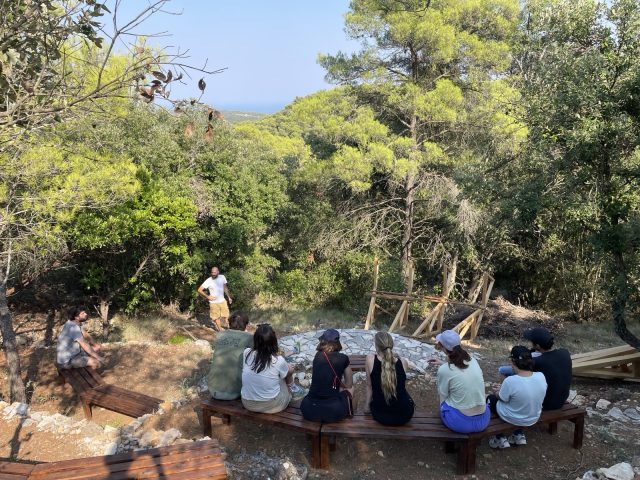Hito Steyerl is a German filmmaker, moving image artist and innovator whose practice engages with the evolving role of technology in the systems of globalisation, surveillance and migration.
Steyerl is one of the co-founders of ISSA and currently teaches New Media Art at the Berlin University of the Arts.
The following conversation was conducted by David Adler for “The Internationalist” published by the Progressive International in December 2022.

David: I would love to know what’s occupying you right now, Hito. What are you working on? What is motivating you?
Hito: In recent years, I have tried to explore technology and the politics associated with it. I’m still trying to think about the consequences of Blockchain technologies, artificial intelligence, and platform capitalism — plus their interactions with one another.
David: How would you say that the relationship between technology and politics is evolving?
Hito: Obviously technology has been extremely relevant to politics because, over the past (at least) two decades, digital platforms have privatised public discourse to a large degree, with known consequences.
Since public discourse and data have become private property owned by monopolist corporations, they have polarised public opinion by monetizing toxicity. Moreover, this has pushed aside other attempts to use technology for communication such as earlier P2P networks. In recent months, I have been exploring these themes and extending them to account for how Web3 is colonising digital space in similar ways to the earlier Web2.
David: Can you explain a bit more about this concept of colonising digital space? What do we mean when we refer to that process? Is it what you had said before about the privatisation of public infrastructures, or is it something more geographically specific?
Hito: Both aspects are true. There is a sort of colonisation or privatisation or appropriation of virtual space, by different blockchain standards which, for now, are still competing with one another.
But also there are geopolitical aspects to it. My collaborators and I have been exploring, for example, the geopolitics of Bitcoin mining or crypto mining in Eastern Europe and also in Central Asia. To say it very simply, political conflict drives destabilisation — including in relation to electrical power and the grid. Cryptocolonialism feeds on extracting power and thus it is a subsection of larger debates around extractivism.
These circumstances are then being exploited to facilitate large-scale crypto mining, which is not only harmful to the environment but is also happening on the back of political conflict and destabilisation. This concerns, for example, the border region between Serbia and Kosovo, or between Georgia and Abkhazia. This also concerns several regions of Kazakhstan, for example.
David: So, in some ways, you could say that these technologies are new, but the geographies of extraction are very familiar?
Hito: Yes, the power source that’s being tapped or exploited is conflict. Cryptocolonialism is a term that had been coined before blockchain and the invention of Bitcoin, by Michael Herzfeld. But it is more relevant now than ever, also to account for other non-standard, indirect situations of colonisation.
David: The concept of ‘crypto colonialism’ captures both the novelty of the ‘crypto’ side and the more classic dynamics of colonialism it follows. What is, in your view, genuinely novel about this concept of crypto colonialism?
Hito: Cryptoeconomies feed on power imbalances, they exploit precarity and the momentum of instability. Even though they proclaim decentralisation they converge towards centralisation in terms of decision-making power and assets. This also comes with a neocolonial philosophical front called Effective Altruism, a fork of utilitarianism that purports to optimize doing ‘good’ using whack math. But what is it? It’s a financialised calculation of the most effective way to do philanthropy. The donor is imagined as an ultra-rich person from the West, and the imagined beneficiary is mostly a poor person from the Global South who is supposed to get, for example, a bednet to protect them from malaria without asking for it. The whole relationship is imagined as a data-driven depoliticised top-down consumer choice for oligarchs — this is the crypto version of internationalism.
There was this excellent suggestion by my colleague Paul Feigelfeld on Mastodon liberating the wasted energy stuck in NFT´s (Non-Fungible Tokens) and meme coins to solve the energy crisis. Until recently one needed a lot of power/electricity to mint these crypto ‘assets’. I would love to perform an act of negative entropy and magically transfer the power stuck in NFT´s and shitcoins to Kobane or Qamishlo or Kharkiv or Kyiv, where autocrats are waging war on infrastructure, heating, electricity etc. If you look at these power/energy relations, questions of data and the internet, platform extractivism is a subcategory of questions of extractivism proper — fossil extractivism, extraction of labour and attention — those are linked with questions of power, emissions, energy wars and related issues like the climate crisis.
David: A case study suggests that technology mirrors politics, rather than driving it. We’ve had centuries of colonialism, extraction, of outsourcing to vulnerable populations; today, these new technologies come in with that promise of liberation but end up reproducing those same dynamics.
Is that inevitable? Is there a way in which these technologies are bound to reproduce existing power dynamics and asymmetries? Was there radical promise to the internet at one point? Or was that always an empty promise because it was always bound to be co-opted and captured by these existing dynamics? Or should we still try to grapple with a more egalitarian digital proletarian vision? What does the internationalist vision look like?
Hito: The internationalist vision is simple: to expropriate corporations and whales and establish data platforms as cooperative structures. Period. It is the opposite of Effective Altruism and other whack optimization cults. Internationalism today means wholesale deoptimisation.
If you look at these power and energy relations, questions of data and the internet, platform extractivism is a subcategory of questions of extractivism proper – fossil extractivism, extraction of labour and attention – those are linked with questions of power, emissions, energy wars and related issues like the climate crisis.
David: Speaking about the Web3 project in particular: Would you say that it is already going to fall victim to the same dynamics of privatisation and colonial capture and extraction? Do you still see this project of Web3 as having some progressive potential?
Hito: Web3 is marketed as a decentralised technology. And the advantage of decentralised technology is that there is no central power, and no one is able to pull the strings. Well, what’s happened is that within Web3, powers have been centralised to a substantial degree already. The collapse of the FTX exchange is just one example.
Another example: power in crypto ventures is measured in possession of tokens. You get some say in the governance of these projects if you are a shareholder and own coins or other shares in a certain project. If you own something, then you’re able to participate in the discourse; you’re not able to participate in decision-making just by the fact of your existence. It’s an almost pre-revolutionary concept, harking back to before the French Revolution. And ownership in cryptocurrencies is more and more shrinking to fewer big owners, who actually control the prices. These are all factors that make it difficult to think of Web3 as something that is going to evolve in a progressive manner. Of course, nothing is ever excluded and there have been some collateral benefits.
David: Give us an example of how we might understand the concept of collateral benefits.
Hito: A small example is redistributing benefits in NFTs. There has been, for decades, this idea of some kind of resale clause for artists which could be implemented via smart contracts. This is very specialised. This is why I say collateral benefits because it’s not really essential. Discussions around DAOs (Decentralized Autonomous Organisations) and governance protocols were a collateral benefit but drowned out by megawatts of casino propaganda, North Korean raids on gaming platforms, creepy Madonna avatars and the overall gamification of austerity.
David: Do you have a sense of where it’s all heading? Do you have a sense of whether these speculative projects are just going to flame out and we’ll be left with more basic infrastructural questions?
Hito: Right now we are in the middle of a major crash. Crypto winter will be probably over at some point, with some semblance of so-called regulation installed but in the meantime there will be further centralisation. What’s more interesting to me is in relation to an internationalist left. Can one overcome the tendencies of identitarian fragmentation that keeps people from being in solidarity with one another? How can this be done? I mainly speak of technology so I am dealing with these questions from this angle. But if you want to abstract them, and ask yourself, what are going to be the important questions in the next five years, both on- and offline? It’s going to be the questions of power structures, fair remuneration, economic inequality and other forms of oppression, the lack of a public sphere and self-governance. It’s these same issues, whether we see them from a tech angle or not.
David: There’s certainly one school of thought that is very concerned about polarisation. That school suggests that polarisation is a vector of profit-making by certain corporations – the engagement, the clicks, the rage. But there’s another school of thought that says polarisation is the essence of politics – and when we have low degrees of polarisation, that’s the era of fake consensus. That second school argues we must rip the band-aid off to see a more honest portrait of our society and its composition. What is class conflict but polarisation realised? Which school of thought are you?
Hito: Sadly, the second school fails to recognize that today’s polarisation is not ‘progressive’ but just mining intensity for profit. Polarisation is happening in terms of an ethnic, nationalist, or otherwise identity-related horizontal axis. This does not help create solidarity. This type of polarisation is the one that drives clickbait and is profitable for big platforms. Other forms of polarisation that would account for economic inequality on a vertical axe are less profitable.
Basically, this type of polarisation happens when people are forced or nudged by technology to identify as products and as very specialised products, with a lot of different attributes so they can be targeted by targeted advertisements, and so on.
David: So in the end, we are still the product. We’re becoming easier and easier to sell to in this new technological landscape.
Hito: Well, let’s just say that our precise location on the shelves of the shop is defined every day in a much more granular way.







